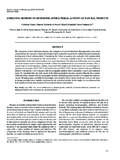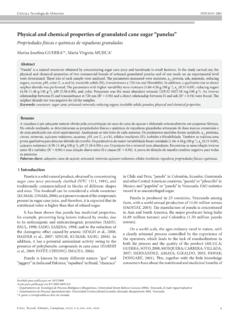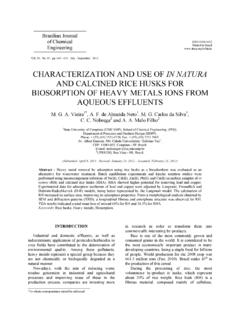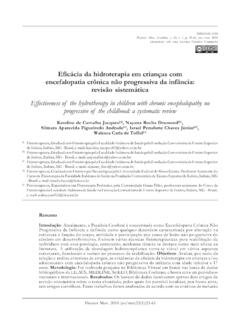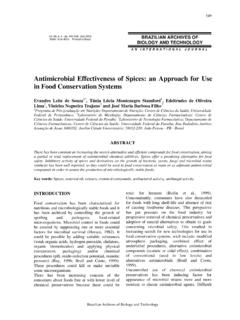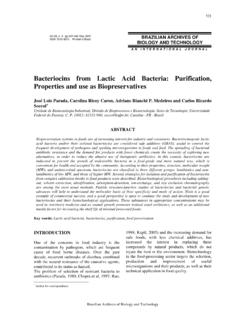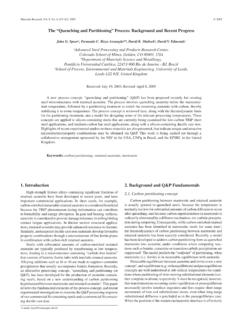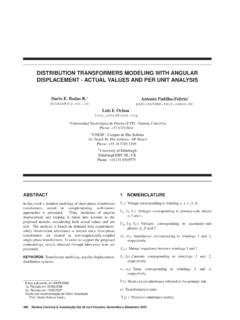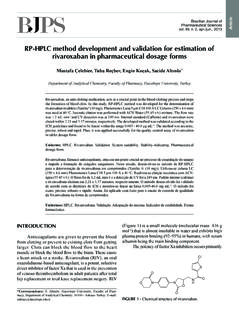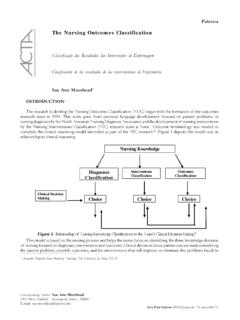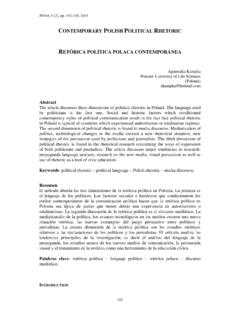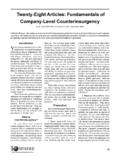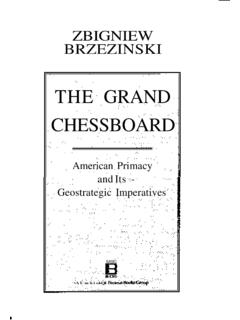Transcription of Assault on the State and on the Market: Neoliberalism and ...
1 ESTUDOS AVAN ADOS 23 (66), 20097 Assault on the State and on the market : Neoliberalism and economic TheoryLUIZ CARLOS BRESSER-PEREIRAThe idea of a self-adjusting market implied a stark utopia. Such an institution could not exist for any length of time without annihilating the human and natural substance of society; it would have physically destroyed man and transformed his surroundings into a wilderness.(Karl Polanyi, 1944)THE OPPOSITION between the State and marketplace is a part of the neoliberal agenda that only became a problem in our time when, in the 1980s and 1990s, Neoliberalism grew so hegemonic that its program came to seem as both natural and legitimate. This opposition, furthermore, placed on the same level two institutions that, by their very nature and structure, are complementary in modern society. The State is the constitutional-legal system and the organizations that guarantee it; it is, therefore, the fundamental institution of every society, the matrix of all other institutions, the coordinating or regulating principle with power over society as a whole, and the political apparatus by which it is permanently executed and amended.
2 While societal actions are coordinated by law (that is, by the juridical order), public administration is what guarantees this coordination. The market , on the other hand, is a more limited, but equally fundamental institution: it is the mechanism of economic competition regulated by the State that, rather automatically, coordinates economic actions; it is the institution that complements the broader coordination carried out by the State . It makes no sense, therefore, to oppose State and market . We may acknowledge problems in the State , we may understand that certain activities might be better coordinated if the State limited its regulation of the market , but we would be wrong to see both forms of coordination as alternatives, because the State will always regulate markets and because ultimate responsibility for good or bad coordination will not be the market s, which has no will of its own, but society s which, through its distinct forms of political organization (the civil society or nation), constitutes a State and, in the democratic State , elects its AVAN ADOS 23 (66), 20098 Modern societies are capitalist societies that organize their territory in sovereign countries or nation-States.
3 Today, within the framework of global capitalism, empires and areas previously occupied by tribes and clans have disappeared, and the entire planet is covered with nation-States that compose a broader and evolving world political system. As countries have opened their markets to international trade, globalization has transformed the world into a great marketplace into one large and increasingly integrated economic system, where the political-territorial unit is the nation- State , comprising a nation (or civil society), a State and a territory. A country that is developed in the economic , social and political realms is a nation well served by a strong State capable of regulating a free and effi cient market . The State and the market are, therefore, institutions of society its instruments of collective action and the main tools for each society to achieve its goals. The primary instrument is the State ; the market , socially constructed and politically regulated, is its complement.
4 The stronger one institution is, the stronger the other will is vain to attempt to increase the power of the market by weakening the State , as the neoliberal ideology has irrationally aspired to do. When, after associating itself with seemingly scientifi c economic and political theories, Neoliberalism orchestrated a veritable Assault on the social and democratic State that began to be established with the New Deal in the United States and was consolidated particularly in post-W WII Europe, the market also came under Assault , because, in the absence of regulation, it ceased to carry out its function in society and become demoralized. Neoliberals and people guided by common sense will probably claim that the dominant ideology of the last 30 years which for this very reason became commonsensical did not seek to weaken the State , but merely to remove it from the productive realm; they wanted the State to cease being a producer and become a regulator.
5 To be sure, part of what they said seemed to corroborate this, yet their words were empty. Their discourse was classical Orwellian doublespeak that says the opposite of what one actually means. The fundamental role of the State is, indeed, that of regulator, defi ning and establishing itself as the constitutional-legal system. But the State can also be a protector, an inducer, an enabler and, in the initial stages of economic development, a producer. Neoliberalism not only rejected a State with these qualities qualities that distinguished or were beginning to characterize the social and democratic State of capitalism s 30 glorious years (1945-1975) but also did not want a regulatory State . The name regulatory State was vacuous. Its goal was to deregulate, not regulate. For Neoliberalism , the State should become minimal , and this meant at least four things: safety net, namely, the entire protective system through which modern societies seek to remedy the blindness of the market regarding social justice; third, it should stop inducing productive investment and technological & scientifi c development, ESTUDOS AVAN ADOS 23 (66), 20099that is, it should relinquish leadership of a national development strategy; and, fourth, it should stop regulating the markets and, in particular, the fi nancial markets, deemed to be self-regulating.
6 The most insistently repeated proposal of the Neoliberal creed has been the deregulation of the marketplace. How could it be possible, then, to speak of a regulatory State ? Much better, and more forthright, would be to say deregulatory State . What neoliberals aspired to, both in rich countries where their ideology emerged and in the developing world, was a weak State that allowed national economies to become a playing fi eld for large corporations, their top executives and fi nancial agents to obtain all kinds of rents in lieu of moderate interest rates, fair business profi ts and professional wages, the legitimate forms of reasonably the economic was the hegemonic ideology from the early 1980s to the early 2000s. It was the ideology adopted and promoted by American governments since Ronald Reagan. After the turn of the century, however, its intrinsic irrationality, its failure to encourage economic growth in developing countries, its effi cacy in concentrating income for the richest 2% of every rich or developing society that adopted its ideas, and the increased macroeconomic instability (as shown by the successive fi nancial crises of the 1990s) became clear indications of the exhaustion of Neoliberalism .
7 Is it possible that, by forcing the State to intervene so forcibly to rescue indebted banks, companies and families, the crash of October 2008 and the ongoing economic and fi nancial crisis might represent the collapse of this ideology the end of its hegemony? The much-disparaged State was fi nally called upon to save the Neoliberalism today is a dead ideology, an embarrassing remembrance that owes its spectral existence only to the nefarious consequences it had on the societies it victimized. Am I, perhaps, being unfair with Neoliberalism and with the neoliberals? Having myself been always critical of this ideology, I call upon the testimony of someone wholly unsuspected, Francis Fukuyama (2004), a conservative but not a neoliberal, who in his book, State -building: governance and world order in the 21st century, vigorously criticizes the neoliberal policies imposed by the United States on less developed countries, particularly in Africa.
8 He showed how such policies failed states1. I am aware that failed nation-States are a borderline case, but borderline cases can help us to clarify ambiguous situations that so often prevail in a long time, I defi ned Neoliberalism as radical economic liberalism, as the ideology of minimal State and self-regulated markets. Although these defi nitions are correct, the fi rst poses a rather serious problem. After all, both political and economic liberalism were social conquests and we ve had many forms of radical liberalism that were not in the least It is better to defi ne Neoliberalism by making a historical comparison with Liberalism. Liberalism, in the 18th century, was the ideology of a bourgeois middle class struggling against an oligarchy of landowners and weapons masters supported by an autocratic State . Therefore, if we wish to characterize Neoliberalism , a ESTUDOS AVAN ADOS 23 (66), 200910reactionary ideology, it is not enough to say that it is a radical type of economic liberalism, because the liberal radicalism of the 18th and early 19th century was revolutionary.
9 Let us, then, attempt to see what Neoliberalism is or was historically. Neoliberalism is the ideology that the wealthy used in the late 20th century against the poor, the workers and a social democratic State . It is, therefore, an eminently reactionary ideology. It is an ideology that, bolstered by the neoclassical economic theory of rational expectations, by the so-called new institutionalism, by the theory of public choice and by the more radical forms of the rational choice school, orchestrated a veritable political and theoretical Assault against the State and against regulated markets over the last 30 years. As a result, if we compare this period with the immediately preceding years, we will see that in the rich countries growth rates were reduced, fi nancial and economic instability was increased and income become concentrated among the wealthiest 2% of the population.
10 As for the developing countries that accepted the ideology the followers of the Washington consensus , growth rates were insuffi cient for them to even hope catching great institutional construction of modern societies is the State . Hegel was the fi rst to understand this fact, to see it as the ultimate crystallization of reason, as the loftiest endeavor of human rationality. For us, it diffi cult to understand the claims of the great philosopher s, because we see our own State as an imperfect normative institution, always needy of reforms (the constitutional-legal system), and as an organizational institution peopled by public servants and politicians replete with administrative and ethical problems (the apparatus of the State or public administration). These, however, are merely differences between design and reality that do not disavow the State as a construct of human will, as the ultimate pursuit of rationality.
